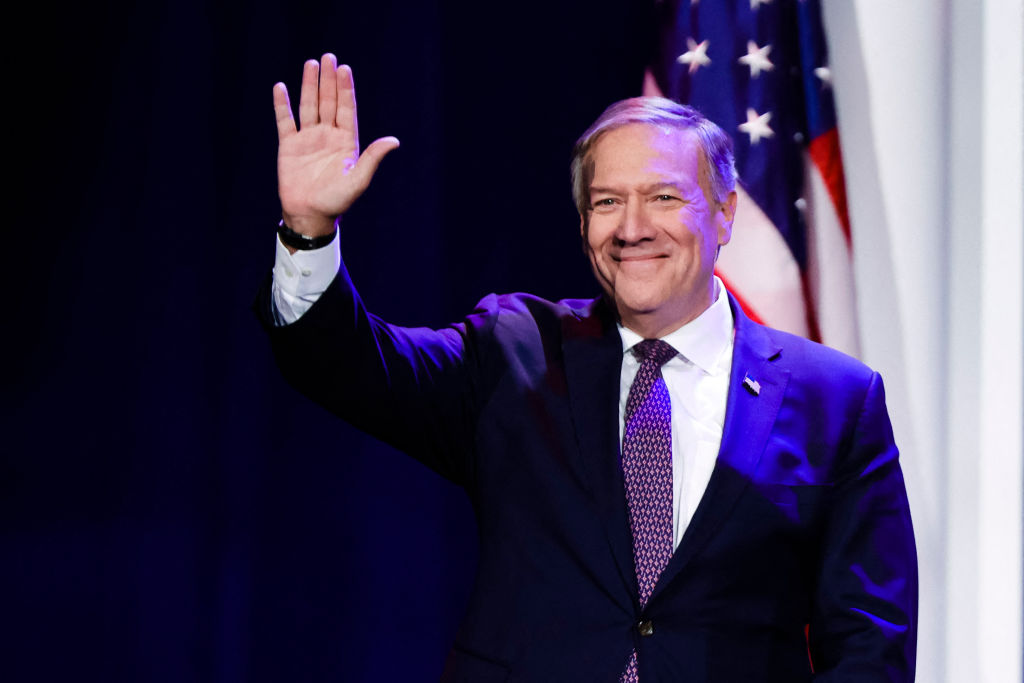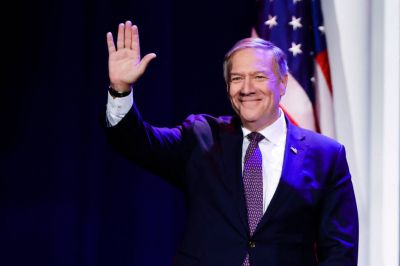If Mike Pompeo opts not to run for president in 2024, it won’t be out of any sense of personal loyalty to Donald Trump.
Trump plucked the little-known congressman from Wichita, Kansas, to serve in his administration, first as director of the Central Intelligence Agency and then as secretary of state. The former president entrusted Pompeo with some of his most sensitive foreign policy endeavors, negotiating détente with North Korea chief among them. That experience makes Pompeo a formidable White House contender, should he run.
But in a wide-ranging interview to discuss his new book, Never Give An Inch: Fighting for the America I Love, Pompeo said the role Trump played in his rise to prominence would not dissuade him from running for president against his old boss.
“The good Lord gave us the tools, the skills. That’s who is responsible for making us,” Pompeo told The Dispatch. “It is not remotely disloyal to present your argument, your case to the American people for anyone—someone who worked on my team or my staff, or who I promoted or gave a job to. Nor, someone who gave me an opportunity as well. Those of us who get into the race, we’ll all go compete, and the American people will sort it out.”
Trump, the only declared candidate in the race for the Republican presidential nomination, might disagree.
The former president is particularly hung up on loyalty. He has accused American Jews of being disloyal, noting their lack of support for him despite his strong support for Israel. He has complained evangelical Christians considering other candidates in 2024 are being disloyal given the conservative majority he facilitated on the Supreme Court that overturned Roe v. Wade.
That hasn’t stopped Pompeo from gauging his 2024 viability. He has spent the past two years traveling to Iowa, New Hampshire, and South Carolina, the key early primary states on the Republican Party’s presidential nominating calendar.
As the time to decide on a White House bid draws nearer, Pompeo is raising money for his political action committee, CAVPAC, and meeting with influential GOP donors and activists. On Friday, copies of Never Given An Inch were handed out, gratis, to Republican National Committee members as they entered a hotel ballroom in Southern California to vote in leadership elections.
“As Susan—my wife, Susan—and I think about what our decision is going to be as we approach the presidential election cycle for 2024, we are thinking our way through not only is this something that we can do, something that we might have the opportunity to be successful and be elected, but if elected, can I actually deliver?” Pompeo said.
The toll a presidential campaign has on family typically tops a potential candidate’s list of concerns. It’s no different for Pompeo, although his family might be more prepared than most. Since the end of the Trump administration, Pompeo has been under guard by a State Department diplomatic security detail, 24 hours a day, seven days a week, because of threats against his life by American adversaries.
“I was serious about protecting America from the threat of Iran … For that reason alone, the ayatollah is not too happy with me, [Iranian] President [Ebrahim] Raisi is not too happy with me, and they’re trying to kill me,” Pompeo said flatly. “It impacts, sort of, my day-to-day moments, but it doesn’t change the way we live our lives. It’s something we know we're going to have to figure our way through.”
Reading almost any of the 17 chapters of Never Give An Inch makes clear Pompeo would seek as president to contain an expansionist China that seeks to displace the United States as the globe’s preeminent superpower. Pompeo is so concerned about Beijing that he is ready to break with entrenched dogmas—those governing Washington foreign policy for decades and those holding sway over the Republican Party in the Trump era.
Specifically, Pompeo reiterated he would junk the “One China Policy,” which he called “outmoded,” and fully recognize Taiwan as an independent nation—a move sure to antagonize the easily antagonized Chinese Communist Party. “Taiwan is, in fact, a separate country. I can prove it. I’m sanctioned—banned from traveling to China and I’ve been to Taiwan twice,” Pompeo said.
He also expressed openness to exploring a multilateral trade deal with nations throughout the Asia Pacific, similar to the Trans-Pacific Partnership. Former President Barack Obama negotiated the accord toward the end of his presidency but Trump withdrew from the deal after winning the White House in 2016. Trump’s opposition to multilateral trade deals resonated with the Republican base and made such agreements controversial in the formerly free-trade-friendly GOP. Pompeo’s willingness to entertain some new version of a trade pact with Asian nations could carry political risk.
“Make no mistake about it, the world should protect itself from China's efforts to use its own currency and its own trade efforts to extort political influence,” Pompeo said. “Whether there needs to be a formal trade agreement to achieve that or not, it depends what’s actually in the trade deal.”
“We need to make sure that we have Western nations trading together freely, building markets in ways that reflect the best of the Western tradition,” Pompeo added. “If we can do that through a trade arrangement amongst countries, I'm happy to consider it.”
Meanwhile, Pompeo concedes North Korea is a global security conundrum, not easily solved by any one president. That’s another issue on which he might spark Trump’s ire should Pompeo jump into the 2024 presidential race.
The 45th president touts his diplomatic overtures to North Korea and dictator Kim Jong Un as part and parcel of his unparalleled abilities to accomplish what conventional politicians can’t. Pompeo doesn’t necessarily disagree, writing at length in Never Give An Inch about how proud he was of the role he played in Trump’s North Korea policy, and his admiration for the former president’s willingness to take big risks.
Yet Pompeo admits the Trump administration failed to eliminate North Korea’s nuclear weapons program and the threat it poses to the U.S. and its allies. In doing so, the former secretary of state appeared to take a subtle shot at a certain Republican.
“Unlike some other politicians, I’m happy to concede we did not achieve our top goal. Our top goal with respect to North Korea was to get them to disarm. We didn't get that done. So, there's more work to do,” Pompeo said. Not surprisingly, the discussion turned back to the problem of China.
“While not completely an agent of China, there are very few degrees of freedom for the leader of North Korea. He is largely under the control of China,” Pompeo said. “When we think about those nuclear programs, we ought to think about them together. It is an extension of the Chinese nuclear program. He is not an independent, he is not a free agent.”






Please note that we at The Dispatch hold ourselves, our work, and our commenters to a higher standard than other places on the internet. We welcome comments that foster genuine debate or discussion—including comments critical of us or our work—but responses that include ad hominem attacks on fellow Dispatch members or are intended to stoke fear and anger may be moderated.
With your membership, you only have the ability to comment on The Morning Dispatch articles. Consider upgrading to join the conversation everywhere.